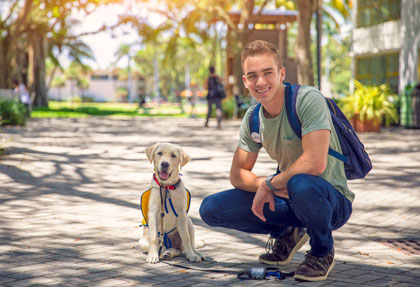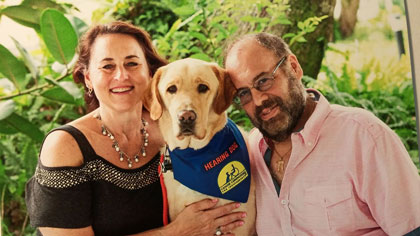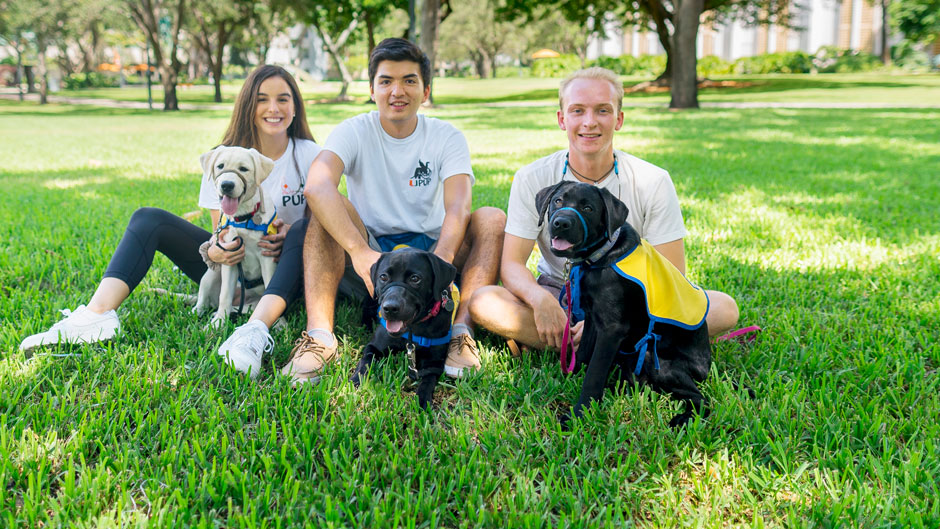As he walks near Lake Osceola at dusk with the University of Miami’s youngest freshman at his side, senior Jack Dickman issues a gentle but firm command. “Hurry!” he says to the tail-wagging blonde who obediently trots to a patch of grass, squats, and relieves herself.
“Good girl,” Dickman, the president of the UPup service club, says as he pats Jackie on the head and gives the 4-month-old yellow Labrador a treat from his pocket.

There were lots of treats and praise this recent Wednesday night for Jackie and two other puppies who have come to college to learn the basic obedience and socialization skills they need to become highly trained assistants for people with physical or mental disabilities. But on this night, Jackie, Caroline and Cassandra, who were bred and temporarily placed with Dickman and two other UPup puppy raisers by the nonprofit Canine Companions for Independence (CCI), are doing some teaching, too.
The indisputable stars of UPup’s Wednesday night training circle, they are demonstrating their skills—how they respond to commands, how focused they remain on their handler, how well they walk on a loosely held leash, how they auto-sit if their handler halts—to about a dozen students who hope to become UPup’s future puppy trainers, the backup squad for puppy raisers.
“The second I heard about the club, I signed up for it,” neuroscience major Isabel Muelas said after taking her turn walking Caroline, another four-month-old freshman, around the training circle outside the Hecht Residential College. “I love her already, and I want to be part of teaching a dog to help someone else.”
But as UPup members who have come before Muelas can attest, raising puppies for CCI is not a walk in the park. It takes hard work and a village of dedicated volunteers to provide the puppies a safe home, proper diet, obedience training, opportunities for socialization, and exposure to a myriad of real-world situations that they’ll need around the clock until they’re about a year and a half old. That’s when Jackie, Caroline, and Cassandra, who is now a year-old sophomore, will head to CCI’s advanced training to see if they have the right stuff to open doors, pull a wheelchair, turn on lights, or perform innumerable other tasks that would help a person with physical or mental disabilities enhance their independence.
“It’s a 24-7 job, even more so than a normal puppy because CCI standards are so high,” said Dickman, a computer science major who joined the club as a sophomore because he missed his family dogs. “We have to make sure they learn no bad habits. They can’t lick the floor. They can’t bark, unless you command them to. They have to spend five hours a day in a crate. You have to submit monthly reports, recording when they were bathed, when they were brushed, what they’re eating. It’s a very demanding full-time job.”
Yet three years after math lecturer Joy Beverly’s husband, Jerry, and oldest daughter, Samantha, convinced her to establish one of the nation’s first University-based service clubs dedicated to raising CCI puppies, UPup is one of UM’s most popular student organizations. Nearly 400 students have signed up, although Dickman says only about 50 are the kind of active members who, after tryouts, could become future puppy trainers. Currently, 20 puppy trainers help Dickman and the two other puppy raisers on campus this semester, junior Nash Whitacre and senior Maddison Stokes, provide the structured environment and training CCI requires by assuming responsibility for Jackie, Caroline or Cassandra when their puppy raisers are in class, at work, or otherwise in need of help or a break.
“It’s definitely a team effort,” Dickman said. “We couldn’t do it without them. It’s a benefit for the puppy trainers because they get one-on-one time with the puppies and it’s good for the puppy raisers because we know someone capable is watching the dogs when we’re unable.”
Beverly, senior residential faculty at the Hecht Residential College, and her husband, who raised their first CCI puppy off campus, are also essential backups. Known affectionately as the UPup “mothership,” their apartment is equipped with a crate and occupied by willing dog-sitters whose vision of turning UM into a permanent training ground for future CCI service dogs is succeeding. Prior to Jackie, Caroline, and Cassandra, five other CCI puppies have gone through the UPup system, and so far, one, the very first one, has graduated from advanced training and matched to a very grateful companion.
Her name is Leslie Berg, a retired math teacher from Staten Island, New York, who was paired with UPup’s founding father, Trenton, in August 2017, just as her husband, Jeff, was diagnosed with cancer. She describes Trenton as “a beautiful blessing in my life for a myriad of reasons.”
Now 56, Berg began losing her hearing at age 12, and depends on Trenton to alert her when someone calls her name, or to a smoke alarm, ringing phone or doorbell, or other sounds she cannot hear when she removes the cochlear implants that restore most of her hearing.

But more importantly, Berg says, Trenton has enabled her to cope with life’s challenges—including her husband’s illness and the loss of her father and father-in-law—just by being there, and being himself.
“He keeps me sane and grounded. He keeps me walking and focused. He keeps me on my toes and reminds me that love is always an available choice no matter how dark it gets,” Berg said, sending “a huge gush of joy and gratitude to everyone near and far who bred, raised, named, trained, and chose me for my beautiful boy.”
It is stories like Berg’s that will give Dickman, who was one of Trenton’s puppy trainers, and his fellow puppy raisers the fortitude to do the unbearable when the time comes—give up the dog they’ve come to love for a higher purpose.
“Emotionally I am so not ready for that,” said Stokes, a psychology major whose Cassandra will head to advanced CCI training in Orlando early next year. “She’s like my child, but she’s going to make a huge difference in someone’s life, which is why I am doing this.”

